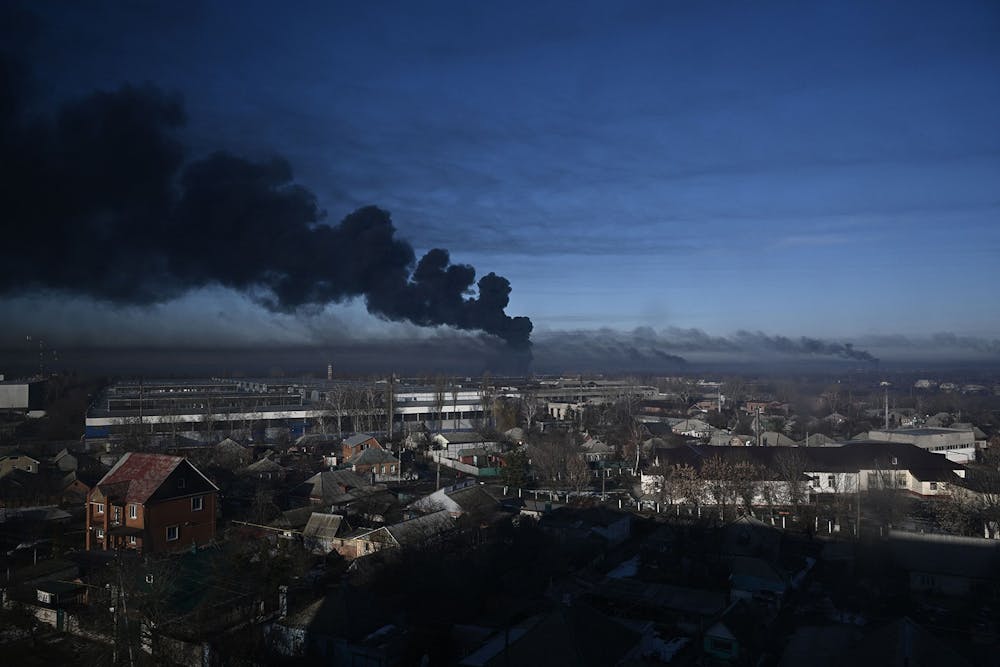Experts and an IU international student from Ukraine discussed the implications of Russia’s attack on Ukraine during a Zoom panel discussion Thursday sponsored by IU’s Robert F. Byrnes Russian and East European Institute. At one point there were more than 600 attendees at the panel, institute director Sarah Phillips said.
Phillips led the discussion in which the experts shared their concerns about failures regarding preventive action and potential international implications of the attack.
“We stand in solidarity with Ukraine and the people of Ukraine,” Phillips said.
NATO is scheduled to hold a meeting Friday to discuss security in and around Ukraine, according to its website.
Iryna Voloshyna, an IU international Ph.D. student from Ukraine, said her entire family is currently living in the country. She said late Wednesday night in Eastern Standard Time she was on the phone with her friend in Ukraine who could not sleep because she heard the explosions.
“I had to call my parents, my sister with dreadful words: ‘Wake up– there’s war in Ukraine,’” she said.
Voloshyna said her friend in Ukraine is asking for fair representation of the situation in Western media during the rapidly changing events.
“There was a lot of misinformation happening, targeting the very existence of Ukraine, and its identity,” she said.
Voloshyna said the best way to help is to donate to credible accounts where proceeds will help the Ukrainian refugees and army.
Robert McVey, Colonel and U.S. Army War College Fellow, said he believes NATO has a few options available to respond to the invasion, including deployment of a task force to neighboring countries or increasing the size of NATO’s presence in Baltic nations. An air defense mission or increased partnerships are also possible, McVey said.
“This has really called into question the deterrence value of sanctions,” he said. “Sanctions have failed to prevent this invasion.”
McVey said he thinks sanctions take time to be effective. U.S. President Joe Biden said personal sanctions against Russian leader Vladimir Putin were still on the table, but not something that he was considering at this time, according to Reuters.
Reviving international order will depend on Western response, McVey said. It will take a reassessment of the strategy of deterrents, such as deterrence by denial or deterrence by punishments, to restore order, he said.
László Borhi, an associate professor in the Hamilton Lugar School of Global and International Studies at IU, said the attack was predictable given the history of Russian foreign relations. Sanctions should have been imposed earlier, he said.
“Great powers are great powers and they always act the same way,” he said. “Security and aggression: two sides of the same coin.”
Borhi said Russia is a declining power economically and demographically, but is still dangerous.
“God knows what the Russians are capable of doing and are willing to do,” he said.
Padraic Kenney, IU history and international studies professor, said Putin makes the argument that Ukrainian identity was created by the Soviet Union. However, he said Ukraine has seen a dramatic change in orientation and thinking.
“Their Russian ethnicity does not mean that they welcome the invasion,” he said. “Ethnicity is not destiny.”
Kennedy said social mobilization in Ukraine is hard to predict, but the citizens are organized for mobilization. He said lack of support for Ukrainians could prevent people from being willing to fight.
“The concern we should have is the signal that an appeasement of Putin would give to dictators around the world, particularly in China,” he said. “I remain optimistic that not only will Putin not advance further, but that this, his adventure in Ukraine, will not succeed.”
Regina Smyth, an IU professor of political science, said Putin and his allies see the durability of his regime as equivalent to the survival of the Russian state and Russian sovereignty. She said the problem with this view is that regime failures are to blame for Russia’s decreased world power, rather than Ukraine or the West.
Smyth said the current sanctions are hurting Russia’s ability to make money from its oil. This will interfere with Putin’s ability to engage in an expensive war, she said.
Smyth said because Putin listened to his advisors, he believed he could isolate the United States from Europe and retain global democracy, she said.
“The advice was wrong,” she said.
Elizabeth Dunn, IU professor of geography, said as borders change, more and more people will be displaced in and outside of Ukraine. Many people are currently leaving Kyiv, the capital of Ukraine, she said.
“I think we're gonna have to ask how we provide humanitarian aid in an age when refugees themselves and mass population movements have become weapons of war,” she said.
Dunn said she thinks the world will not see a new international order after this attack, but rather a reorganization of the balance of power in Europe and around the world.
“We should prepare for the world not to make much sense any more,” Dunn said.
She said believing Russia has the right to determine the fate of another country tears down the fundamental idea of democracy and order of nation states.
“Ukraine is an independent country with the right to decide its own foreign policy and to choose its own alliances,” she said.
Dunn said international non-governmental organizations will likely move into Ukraine for humanitarian response soon.
There will be a protest at 1 p.m. Friday at the Sample Gates to protest the Russian aggression in Ukraine.
“We have to be visible,” Voloshyna said. “We have to speak up.”




